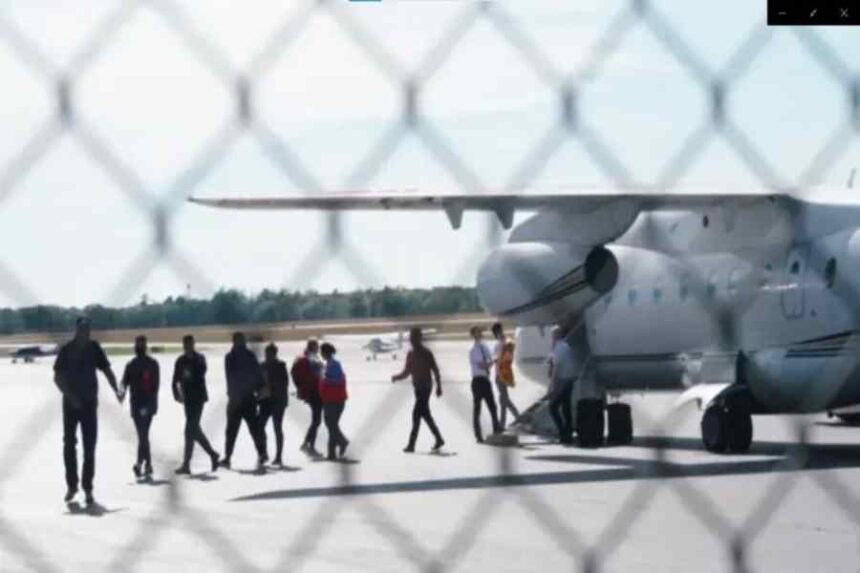In a multifaceted legal saga blending the complexities of immigration law, state governance, and personal liberties, a pivotal chapter unfolds within the halls of a federal court in Massachusetts. Here, a group of Venezuelan migrants embarks on a pursuit for justice against the aviation entity tasked with their transport to Martha’s Vineyard. This landmark ruling arrives nearly twenty-four months post the contentious initiative spearheaded by Florida Governor Ron DeSantis, thrusting into the limelight the enduring discourse on immigration regulations pervading the national landscape.
The court’s decision signifies more than a mere legal verdict; it symbolizes a battleground where the narratives of migrants seeking refuge intertwine with broader socio-political currents. At its core lies the fundamental question of accountability: to what extent are corporations liable for the welfare of individuals under their purview, especially in contexts as sensitive as immigration?
As the case unfolds, it casts a penetrating light on the intricate tapestry of rights, responsibilities, and power dynamics shaping the immigrant experience in contemporary America. Beyond the confines of legal jargon, it serves as a poignant reminder of the human dimensions underlying policy debates, urging a collective reckoning with the moral imperatives at stake.
Flight to the Vineyard: A Political Statement?
The story began in 2022 when fifty migrants, hailing from Venezuela, found themselves on charter flights from San Antonio, Texas, to Martha’s Vineyard, an island renowned for its summer retreats and liberal populace. The move, funded by the Florida Legislature to the tune of $1.5 million, was widely perceived as an attempt by Governor DeSantis to criticize the Biden administration’s immigration strategies amidst surging illegal border crossings.
Upon their unexpected arrival, the Martha’s Vineyard community, unprepared for the influx, rallied to provide immediate assistance to the migrants. The Massachusetts National Guard was subsequently activated, underscoring the severity of the logistical and humanitarian challenges posed by the sudden relocation.
The Lawsuit: Seeking Accountability
At the heart of the unfolding legal saga is the lawsuit against Vertol Systems Co., the Florida-based aviation firm that facilitated the flights. The legal action, initiated by a contingent of migrants alongside an immigrant rights group, contends that the operation was not only misleading but infringed upon their civil rights. The plaintiffs, identified as Yanet, Pablo, and Jesus in court documents, allege that promises of employment and housing in Massachusetts were made — assurances that never materialized.
A pivotal aspect of the lawsuit is the claim that the migrants were unwittingly thrust into a national political debate, a strategy purportedly aimed at drawing attention to perceived failures in federal immigration policy. The case also highlights the role of a videographer, allegedly hired by the DeSantis administration, to document the migrants’ arrival and their subsequent transportation on the island, further adding layers to the controversy.
Judicial Decisions and Reactions
The decision by U.S. District Judge Allison D. Burroughs to allow the lawsuit to proceed against Vertol Systems Co. underscores the complex legal and ethical dimensions of the case. While Governor DeSantis and other state officials were initially named in the lawsuit, claims against them were dismissed due to jurisdictional issues. However, the dismissal was “without prejudice,” leaving open the possibility for future legal challenges.
Judge Burroughs’ ruling critiqued the operation’s underlying motivations, questioning the legitimacy of using vulnerable individuals as pawns in a broader political contest. This stance has been echoed by advocacy groups, who view the court’s decision as a significant victory in holding private entities accountable for their role in such operations.
Conversely, representatives for Vertol Systems Co. have expressed satisfaction with the partial dismissal of the case, although they dispute the plaintiffs’ interpretation and analysis of the events. This legal back-and-forth mirrors the broader national discourse on immigration, state versus federal jurisdiction, and the rights of migrants.
Implications and Ongoing Debates
The Martha’s Vineyard incident and subsequent legal battles highlight the intricate dance between political objectives, legal boundaries, and human rights. As the case proceeds, it not only seeks justice for the migrants involved but also raises critical questions about the use of human beings in political maneuvering, the responsibilities of private companies in state-led operations, and the broader implications for immigration policy and state-federal dynamics in the United States.
Governor DeSantis’ office has maintained that the flights were conducted lawfully, emphasizing the operation’s role in bringing national attention to what they describe as a crisis at the southern border. This stance points to a continuing strategy of leveraging immigration as a key issue in political and ideological debates.
Meanwhile, the response of the Martha’s Vineyard community — from immediate humanitarian assistance to ongoing support for the migrants — reflects a microcosm of the broader national divide over immigration. It underscores the challenges local communities face when national politics manifest on their doorsteps, often without warning.
Looking Ahead: A Test Case for Immigration Policy and Human Rights
As this legal challenge moves forward, its outcomes could have far-reaching implications for how states engage with immigration issues, the accountability of private companies in governmental operations, and the rights of migrants within the complex web of U.S. immigration policy. Moreover, it shines a spotlight on the human stories behind the headlines, bringing personal narratives to the forefront of the immigration debate.
This case also serves as a poignant reminder of the ongoing challenges facing the U.S. immigration system, prompting calls for comprehensive reform and a balanced approach to addressing the root causes of migration. As America continues to grapple with these issues, the Martha’s Vineyard episode stands as a symbol of the tensions, challenges, and human costs associated with current immigration policies and practices.
In sum, the lawsuit against Vertol Systems Co., stemming from the events at Martha’s Vineyard, encapsulates a broader dialogue on immigration, political tactics, and the ethical considerations of involving migrants in political narratives. As the legal proceedings unfold, the nation watches closely, aware that the implications extend far beyond a single legal case, touching upon the core values and principles at the heart of American democracy.




